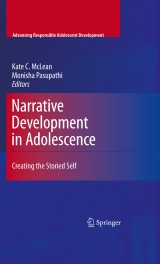Details

Narrative Development in Adolescence
Creating the Storied SelfAdvancing Responsible Adolescent Development
|
96,29 € |
|
| Verlag: | Springer |
| Format: | |
| Veröffentl.: | 11.11.2009 |
| ISBN/EAN: | 9780387898254 |
| Sprache: | englisch |
| Anzahl Seiten: | 237 |
Dieses eBook enthält ein Wasserzeichen.
Beschreibungen
Monisha Pasupathi and Kate C. McLean Where Have You Been, Where Are You Going? Narrative Identity in Adolescence How can we help youth move from childhood to adulthood in the most effective and positive way possible? This is a question that parents, educators, researchers, and policy makers engage with every day. In this book, we explore the potential power of the stories that youth construct as one route for such movement. Our emphasis is on how those stories serve to build a sense of identity for youth and how the kinds of stories youth tell are informed by their broader contexts – from parents and friends to nationalities and history. Identity development, and in part- ular narrative identity development, concerns the ways in which adolescents must integrate their past and present and articulate and anticipate their futures (Erikson, 1968). Viewed in this way, identity development is not only unique to adol- cence (and emergent adulthood), but also intimately linked to childhood and to adulthood. The title for this chapter, borrowed from the Joyce Carol Oates story, highlights the precarious position of adolescence in relation to the construction of identity. In this story, the protagonist, poised between childhood and adulthood, navigates a series of encounters with relatively little awareness of either her childhood past or her potential adult futures. Her choices are risky and her future, at the end, looks dark.
Self-Continuity Across Developmental Change in and of Repeated Life Narratives.- Emerging Identities: Narrative and Self from Early Childhood to Early Adolescence.- Patterns of Family Narrative Co-construction in Relation to Adolescent Identity and Well-Being.- Autonomy, Identity, and Narrative Construction with Parents and Friends.- What He Said to Me Stuck: Adolescents’ Narratives of Grandparents and Their Identity Development in Emerging Adulthood.- Life Stories of Troubled Youth: Meanings for a Mentor and a Scholarly Stranger.- Re-storying the Lives of At-Risk Youth: A Case Study Approach.- Constructing Resilience: Adolescent Motherhood and the Process of Self-Transformation.- Negotiating the Meanings of Adolescent Motherhood Through the Medium of Identity Collages.- How Violent Youth Offenders and Typically Developing Adolescents Construct Moral Agency in Narratives About Doing Harm.- Critical Narrating by Adolescents Growing Up in War: Case Study Across the Former Yugoslavia.
<p>Kate C. McLean is an assistant professor in the Department of Psychology at the University of Toronto. She completed her Ph.D in Developmental Psychology at the University of California, Santa Cruz in 2004.</p><p><br>Monisha Pasupathi is an associate professor of developmental psychology in the Department of Psychology at the University of Utah. She completed her Ph.D. in Personality Psychology at Stanford University in 1997, and subsequently served as a post-doctoral researcher at the Max Planck Institute for Human Development in Berlin, Germany, until 1999.<br></p>
<p>The need to establish a narrative self reaches an important peak during adolescence as teens work to understand life events and establish their self-identity. The first book to examine narrative development during adolescence in depth, <i>Narrative Development in Adolescence: Creating the Storied Self</i>, focuses on both stable and at-risk youth as they construct, organize, and tell their life stories and link these stories to larger developmental contexts as they grow to maturity. </p><p>Renowned specialists identify such core skills as reflection, meaning making, and decision making as well as crucial domains, including autonomy and moral agency evolving across normative adolescence, and relate them to the narrative process. Deficits in these key areas are seen in the more contradictory and incoherent stories narrated by delinquent youth, teenage mothers, and victims of war and violence. In addition, these themes are observed as adolescents process and interpret the narratives of others.</p><p>This volume offers insights into the crucial task of identity development, and explores new possibilities for counseling and therapy. Its authoritative and accessible coverage:</p><p><ul><p><li>Examines the relationships between narrative and developmental outcomes</li><li>Identifies normative and problematic issues in adolescents across cultures and social backgrounds in the United States, Canada, Germany, the former Yugoslavia, and New Zealand</li><li>Offers current research on adolescent narrative development, with attention to theoretical bases and methodological issues</li><li>Discusses the roles of parents, grandparents, and peers in shaping narratives</li><li>Features case studies of narratives from at-risk youth</li><li>Includes findings on how early narrative development predicts narrative identifying adolescence</li><p></ul><p><p><i>Narrative Development in Adolescence</i> is an essential resource for researchers, clinicians, and graduate studentsin developmental, clinical child, and school psychology as well as allied mental health and education fields. It is a must-have volume for anyone conducting research or working with adolescents to ensure their healthy development and successful transition to adulthood. </p>
First volume to consider how narrative is integral to healthy, normative development during adolescence Examines the links between narrative and broader contextual factors and outcomes A must-have resource for anyone conducting research on adolescence or working with adolescents to ensure healthy development and outcomes Explores the burgeoning body of research in the field of narrative and development processes in a variety of contexts, including personal, social, and cultural Details the theories used to derive hypotheses and methods in this field of research Synthesizes the latest research on narrative in adolescence Offers both qualitative and quantitative work and spans different cultures, historical contexts, and both normative and pathological issues for adolescent development Includes supplementary material: sn.pub/extras

















